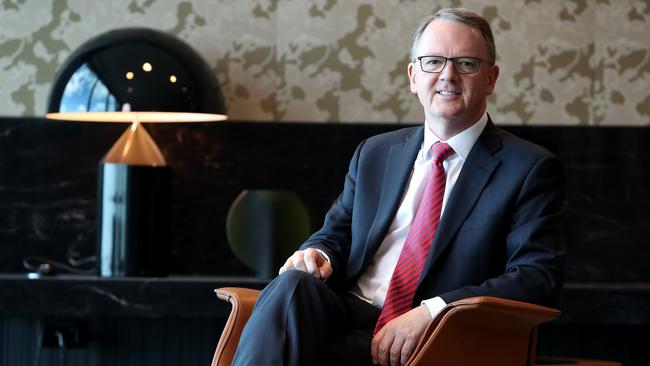Woodside CEO Peter Coleman steps up call for carbon pricing
Woodside CEO Peter Coleman has stepped up calls for a global price on carbon at the LNG 2019 conference in Shanghai.

Woodside chief executive Peter Coleman has stepped up calls for a global price on carbon in a speech at the LNG 2019 conference in Shanghai yesterday.
Mr Coleman said while LNG was part of the solution to moving towards cleaner energy, the industry needed to push for broader policy changes to reduce carbon emissions on a global basis.
“I’m not alone in thinking carbon pricing implemented internationally would be the most effective mechanism for achieving the emissions reductions that are needed,” he said.
He said a carbon pricing regime would help encourage coal to gas switching which had “the potential to be even more significant as new LNG markets open up in Asia”.
Woodside, Shell and BHP have all called on the federal government to introduce a price on carbon.
Mr Coleman said the LNG industry needed to “partner” with governments to “support genuine global action that delivers on the goals of the Paris agreement (on climate change).”
He said calls for policies to reduce carbon emissions needed to be done in a way that was not seen to be “in conflict with jobs and prosperity”.
“They must coexist. To set them up as being in conflict is to doom emissions reduction efforts to failure.”
He said this process had been “particularly acute in resource-rich countries like Australia, where we have learned through a decade of climate policy paralysis that society will not support policies if they are perceived to threaten living standards”.
Mr Coleman’s speech in Shanghai yesterday follows one he made in November dedicated to the threat of climate change, saying Australia had all the resources it needed to support a lower carbon society in an internationally competitive way which would ensure continued jobs and growth.
He told the Shanghai conference that the LNG industry could also help reduce global emissions by developing new markets for LNG to displace higher emissions fuels. This would include the use of an LNG product developed for the transport sector that would allow it to displace heavy fuel oil in ships or oil in diesel trucks and trains.
Mr Coleman said the LNG industry needed to be seen to be “a significant contributor to reducing greenhouse gas emissions”.
It also needed to improve its own operations by increasing energy efficiency, reducing methane emissions across the natural gas value chain and investing in biosequestration.
“Our industry needs to show it is committed to effective action on climate change,” he said.
He warned that the LNG industry should not be “comforted” by the current forecasts of a shortage of supply going into the next few years but should be working hard to explain to the world that it was important in the move to a low carbon environment.
He said the coal industry had been “comforted” a decade ago by forecasts of increasing strong demand, but had seen community attitudes towards the use of coal change.
“Forecasts can change as attitudes change,” he said.
“We have to work hard to make sure people fully understand the contribution our product makes to reducing the global greenhouse gas footprint and improving air quality,” he said.
He said this was very evident in China where there was a strong commitment to cleaner energy which had created opportunities for gas and renewable energy.
Mr Coleman said the LNG industry needed to be advocating for policy solutions to help the world cope with “an increasingly carbon constrained world”.
“(LNG) is part of that world because of the contribution it makes to both reducing emissions and combating energy poverty,” he said.
At the Shanghai conference this week Hudong-Zhonghua Shipbuilding announced plans to build the world’s largest LNG carrier to help cope with China’s demand for cleaner energy. The company said it would build a carrier with a capacity of 270,000 cubic metres in conjunction with a Norwegian company. The super-sized carrier is due to be finished by the end of 2020.
Chevron chief executive Mike Wirth said China was set to become the world’s leading importer of natural gas. China imported a record 53 million tonnes of LNG last year as the government has pushed for a move away from coal fired power.


To join the conversation, please log in. Don't have an account? Register
Join the conversation, you are commenting as Logout